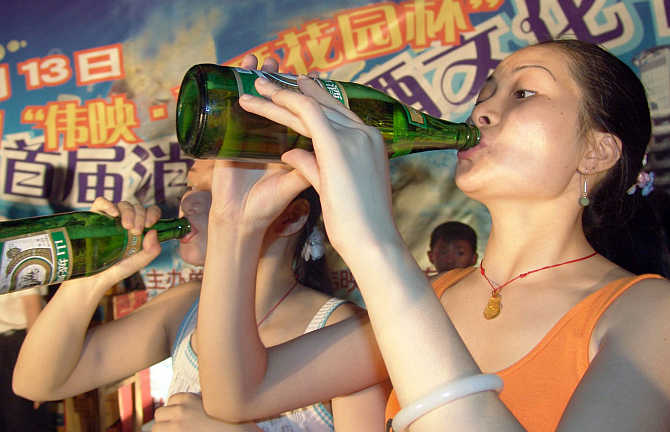在酒吧里 Zài jiǔbā lǐ “In de bar": In deze les leer je hoe je jezelf in een Chinese bar kunt redden: 老板,我要啤酒。(in Pinyin: Lǎobǎn, wǒ yào píjiǔ.)
酒吧 jiǔba: (zn.) kroeg
我 wǒ: (vnw.) ik
要 yào: (ww.) willen
啤酒 píjiǔ: (zn.) bier
(www.chinees-leren.nl/book/export/html/46)
(www.chinees-leren.nl/node/884)
Bier:
Chinees (kantonees, vereenvoudigd)be-jàu (啤酒)
Chinees (mandarijn, traditioneel) píjiuv (啤酒)
(www.brouw-bier.nl/theorie/talen/)
English: Beer Chinese: 啤酒 Pinyin: Píjiǔ
Chinese is an extremely complex language but chances are that you will end up learning some Chinese words while traveling through the country (www.traveltobealive.com/destinations/china/chinese-phrasebook/).
The Jing-A pub in Beijing, Oct. 23, 2015. As tastes change and the Chinese middle class swells with young, affluent professionals, the country's consumers are swapping mass-produced local beers for imports and local craft beers, the type of opportunity at the heart of Anheuser-Busch InBev’s $106 billion deal to buy SABMiller, its rival global brewer.
Sim Chi Yin/The New York Times
Amie Tsang and Cao LiThe New York Times
January 15, 2016
When Jin Xin first started selling imported premium beer a decade ago, his bar manager predicted that it would take a month or two just to sell a single case. But within a few years business picked up, and soon customers started frequenting the bar for its India pale ales and other European beers.
Now, one of Jin’s bars, NBeerPub, tucked away in a laid-back part of Beijing’s old town, buzzes with young Chinese customers ordering imports like Delirium Tremens, Lindemans Framboise and Brewdog Punk IPA. Jin even sold a bottle of Brewmeister Snake Venom, a high-alcohol barleywine-style beer from Scotland, for about 2,700 renminbi, or more than $420.
“Slowly, Chinese people have more money in their pocket,” Jin, 43, said in his apartment, where over 6,000 bottles from more than 60 countries filled the shelves. “After they have money, some want something better in terms of taste as well as lifestyle, especially young people.”
As tastes rapidly change, Chinese consumers are swapping mass-produced local beers for imports and local craft beers (www.adn.com/article/20160115/china-embraces-craft-beers-and-brewing-giants-take-notice).
Beer? Beer! Discover Beer in China!
Thanks to the wonderful season, beer becomes a hot drink among the Chinese locals and expat people. People are talking while enjoying different kinds of beers in various festivals, but when you are swigging the bottle of beers do you think of this question - How many beer brands do you have tried already in China? Domestic? International? If you are a beer lover or beer brewing master, it’s recommended to know the story behind Chinese beer.
The brewing ingredients of Chinese beer contains almost the same ingredients as everywhere else, water, hops, and malted cereal grains, principally barley in addition to yeast and auxiliary material included wheat, corn and kinds of sugar. Several years ago, most Chinese beers are pale lagers, but now it’s not hard to find other styles like brown beer, stout beer and so on. In China there are more than 1500 domestic and international beer brands with exception of homebrewed and directly imported beer. However the vast majority of China's breweries serve only their local vicinity. It’s estimated that there are about 140 brands which you may already heard of.
Among the expat beer lovers, “Tsingtao” beer is never an unfamiliar name, according to Chinese media report 2012 ‘’Tsingtao’’ was announced in the TOP 10 ranking for most well-known beer brand in mainland of China. With no doubt “Tsingtao Beer ( simplified Chinese:青岛啤酒 )” is a leading brand of the listing. Tsingtao Brewery is China's second largest brewery and the beer is originally produced in Qingdao in Shandong province. ...Followed by Tsingtao, “Snow Beer ( simplified Chinese:雪花啤酒 )” and “Yanjing Beer ( simplified Chinese:燕京啤酒 )” these two Beijing local brands are well-known by locals. In 2008 Snow beer was the best selling beer brand with annual sales of 61 million hectoliters beer (www.expatree.com/blog/beer-beer-discover-beer-in-china_75).
In China, Anheuser-Busch InBev and SABMiller are betting on premium products.
The two beer behemoths were among the first international entrants into China in the 1990s and initially teamed with local brewers. At the time, domestic breweries produced beer of inconsistent quality, but they were quickly multiplying, and consumption was soaring along with disposable incomes.
SABMiller took a 49 percent stake in a joint venture that makes Snow, which is now China’s best-selling beer brand. Anheuser-Busch InBev has since bought Harbin and Sedrin, two other top domestic brands. Together, the international brewers account for about one-third of the overall beer market in China.
As they pursue a merger, given their dominance, Anheuser-Busch InBev and SABMiller are expected to prune their portfolio in China to keep regulators happy, though it remains unclear where the trimming will be done. Some analysts think they would be able financially to justify the sale of a big domestic brand like Snow, since the market is moving toward premium offerings (www.adn.com/article/20160115/china-embraces-craft-beers-and-brewing-giants-take-notice).
Chen : “I would rather be spending money on few quality beers than buying lots of cheap beers and feeling full and headachy,” she said. “It’s more about the lifestyle I choose than simply drinking.”
(www.adn.com/article/20160115/china-embraces-craft-beers-and-brewing-giants-take-notice).
Tsingtao (青島啤酒 of Qīngdǎo píjiǔ) een Chinees bier dat gebrouwen wordt door de Tsingtao Brewery uit Qingdao.
Deze brouwerij werd in 1903 door Duitse kolonisten gesticht. Het is nu China's grootste onafhankelijke brouwerij met een marktaandeel van twaalf procent. Het Tsingtao-bier wordt tegenwoordig naar vijftig landen geëxporteerd; het is wereldwijd het tweede meest verkochte Chinese bier (na Snow) met een exportaandeel van ongeveer vijftig procent.
Tsingtao is een andere schrijfwijze voor Qingdao, met name naar een vereenvoudigde versie van de transliteratie van Wade-Giles, zoals die in de vorige eeuw door de (Europese) postdiensten gebruikt werd.
De ingrediënten zijn water, gerstemout, rijst en hop (https://nl.wikipedia.org/wiki/Tsingtao).
Door het openen van een bierfabriek in Harbin, de hoofdstad van de provincie Heilongjiang, maakte China in 1900 voor het eerst kennis met bier. In 1903 openden de Chinezen met Engels/Duitse steun een tweede fabriek in Qingdao. Hier brouwt men het Tsingtao bier (青島啤酒 of Qīngdǎo píjiǔ). Inmiddels is dit ėėn van China’s grootste brouwerijen en exporteert men dit bier naar 62 landen.
China is sinds 2009 zelfs de grootste bierproducent ter wereld. Iedere provincie van China produceert zijn eigen bier waardoor je kan kiezen uit ruim 1500 biermerken (www.dagelijksezaken.nl/eten-drinken/tsingtao-bier-uit-china/).
Tsing Tao heeft een licht moutige bruisende, milde smaak met een vleugje zoete noten.
Tsingtao pilsener wordt uitsluitend gebrouwen met Chinese ingrediënten en met het kristalheldere mineraalwater uit het Laoshan-gebergte. Tsingtao wordt gebrouwen in de havenstad Qindao door bierbrouwerij Tsingtao. De brouwerij werd opgericht in 1903 en groeide uit tot de grootste van China. Destijds was bier in China nog nauwelijks bekend en voorbehouden aan de elite. Maar mede dankzij Tsingtao veranderde dat en tegenwoordig is bier ook in China een populaire drank. Tsingtao is nog altijd het meest verkochte biermerk in China (www.biernet.nl/bier/merken/tsingtao).
Tsingtao concurreert in China tegen SABMiller en China Resources Enterprise Ltd en heeft als doel om in 2014 100 miljoen hectoliters te brouwen. China is wereldwijd nummer één in de pilsproductie. Per hoofd van de bevolking drinken de Chinezen in 2010 nog slechts 33,4 liter per jaar. Ter vergelijking in Nederland is dit ruim twee keer zoveel (http://bier.blog.nl/biernieuws/2011/08/12/explosieve-groei-op-chinese-biermarkt).
 Snow (vereenvoudigd chinees: 雪花啤酒, letterlijk Sneeuwvlokbier) is een Chinees biermerk.
Snow (vereenvoudigd chinees: 雪花啤酒, letterlijk Sneeuwvlokbier) is een Chinees biermerk.Snow is een lager dat gebrouwen wordt door CR Snow (China Resources Snow Breweries Ltd), een joint venture tussen SABMiller en China Resources Enterprises Ltd. Het bier wordt gebrouwen sinds 1993 en is sinds 2008 het meest verkochte biermerk ter wereld met een jaarlijkse productie van 61 miljoen hectoliter, enkel verkocht in China. Het bier werd in 1993 oorspronkelijk gebrouwen bij drie brouwerijen en werd verder uitgebreid naar 80 brouwerijen in China in 2011 (https://nl.wikipedia.org/wiki/Snow_(bier)).
Chinees bier Snow populairste bier ter wereld
Sneeuwvlokje. Niet echt een spannende naam voor een biertje. En toch was dit het populairste biertje ter wereld in 2013! Het bier Snow (in het Chinees letterlijk Sneeuwvlok) staat op nummer 1 in de top tien van meest verkochte bieren ter wereld in 2013. Het wordt gemaakt door een samenwerking tussen SAB Miller en China Resources. China is een snel opkomende economie. Hierdoor zijn er steeds meer Chinezen die tijd en geld hebben om van een biertje te genieten. Ook al wordt er in de VS nog steeds meer bier per persoon gedronken, in China is de totale bierconsumptie zo'n 110 miljard biertjes per jaar. Dat is grofweg twee keer zoveel als de Amerikanen. China brouwde in 2013 ook het meeste bier ter wereld (www.biernet.nl/nieuws/chinees-bier-snow-populairste-bier-ter-wereld) (www.z24.nl/economie/dit-zijn-de-populairste-biertjes-ter-wereld-470497).
A worker inspects bottles of Snow Beer at a production line at the China Resources Snow Breweries in Tianjin, China. China Resources Enterprise Ltd. is struggling amid a slowdown in the Chinese economy, having posted a full-year loss in March. Photographer: Doug Kanter/Bloomberg...China Resources Enterprise Ltd. rose the most in more than two decades after announcing it will sell businesses including its main money-losing retail venture with Tesco Plc, and focus on the world’s best-selling beer.
The stock ended 56 percent higher at HK$23.70 by the close in Hong Kong, after resuming trading from an April 8 halt.
The company will sell its non-beer assets for HK$28 billion ($3.6 billion) and as much as a 10 percent stake to its state-owned parent, China Resources Enterprise said in a statement to the city’s stock exchange. ...China Resources Enterprises’ Snow Beer brand had 23 percent of market share in China in 2013, compared with Tsingtao Brewery Co.’s 17 percent in second place, citing its own data in a presentation Tuesday (www.bloomberg.com/news/articles/2015-04-20/china-resources-parent-to-buy-non-beer-assets-and-10-stake).

























